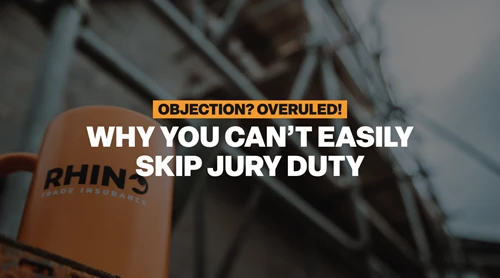This one is for all the tradespeople out there who love a plan. Some people love taking some time to refresh at the end of the year, sitting down and reflecting on the previous 12 months and where they wish to be in the next year.
This post has tips for tradesmen and women on how best to create a business plan for the new year. It doesn't matter if you are starting up or are long into your career as a business owner. This guide has something for everybody.
Building a business plan
As a busy tradesperson, writing down your business thoughts and ideas will help you stay on track and provide direction. The procedure we refer to as writing a business plan. It doesn't have to be a masterpiece, but it will assist you in formulating a business strategy to help you grow your trade business! On top of this, if you ever require finance to grow or a loan to buy another work van, you will need one when applying for capital!
When you start and grow a trade business, there will probably be some setbacks along the way. Learning to adapt to change is a major positive in this situation. When writing a plan, consider any opportunities and threats that may affect your company and how you will respond. Thinking like this will help develop your plan so that you become bulletproof in any scenario. Careful attention to detail itself is often more important than the final written business plan.
Things to think about include the following:
- What are your objectives for the short, medium, and long term?
- What makes your company stand out and keep customers coming back?
- What kinds of issues do you foresee arising, and how do you intend to address them?
- What kind of tradesman insurance is best for my business?
If you (as a fair few tradespeople do) have already started your business without a plan, you may have noticed that as you get more customers and grow, things become unmanageable. A business plan will help with this, and as we said, it will also help with getting finance if you ever ask banks or lenders for money to expand your trade business.
Define your business
What exactly does your company do? We get into the specifics of your business plan here. In this section, you want to define what your business does and how you intend to accomplish your goals and objectives.
Your business plan should be interesting to read and simple to understand. It must plainly state what your company does and why you should be doing it. Presenting your plan needs to pique the listener's interest for you to get what you're asking for.
Consider including:
The company's background:
- Who owns the business? The business structure.
- When you first started trading and the current state of the business. Include information about your personal industry experience as well as what you have done so far to establish the business.
A brief description of your business:
- Details about every service you provide.
- Who are your customers? Give a list of detailed businesses or customers you will help.
- How much money will your company make, and what will make it thrive, like where it is located, how it functions, and how much industry knowledge you have?
- Your elevator pitch, goal or mission statement: a single sentence that defines the company, its purposes, how it will differ from others, and where it will fit in the market.
- Describe any significant industry characteristics, such as unique regulations or technological shifts.
In this section, you could also show off your market research on any local competition, such as other tradespeople or businesses in your line of work. Knowing who your rivals are. You will need to evaluate the competition, look for themes, and determine:
- What your rivals are like; Draw a list of them, listing their advantages and disadvantages. What can you offer that they cannot?
- Techniques that will give you a leg up. Why should customers choose you over other businesses that provide services similar to yours? Are you accredited, do you provide guarantees for your work, offer competitive pricing, and does your location give you an advantage? Are you an expert in a particular service, or do you have years of experience?
- Describe any obstacles you may face, such as staffing issues, knowledge, tools, or work, and how you will work around them.
What to charge, finances and forecasting
A tradesperson or contractor typically charges per hour or day in addition to the cost of materials or will quote a price for the overall project. Because they vary from project to project and are frequently passed on to the paying customer, these are referred to as 'variable costs'.
That's why it's imperative to work out what to charge for your work. You are a skilled professional, after all. Before taking out a loan, investing your savings and quitting your day job, it is essential to determine whether or not you will be able to make money from starting your own business.
When building a business plan, there are generally three sections to detail income and expenses. As a tradesman, you are best served to determine how much you aim to earn in a year and divide it by the number of hours you work to get a basic hourly rate. Putting this into a plan will consist of:
Profit and Loss statement: This demonstrates how your company will generate profit. Cost of materials, gross profit margin, running costs, net profit before taxes, and total expenses are all included in this figure. The formula used is: Pay - Costs = Profit/loss.
Cash flow forecast: A report on anticipated cash sales, which include money due to the company (receivables) and money paid to you for work done, as well as expenses for materials, overheads, marketing, sales, and employee pay. It illustrates how much money will be required to fulfil your business responsibilities when it is required and from which source. Before entering numbers into your income statement or balance sheet, this statement is a great way to forecast and plan.
Balance sheet: This gives a preview of what a trade business claims and owes at a particular date (as opposed to throughout some undefined time frame like the other two reports). It outlines all of the primary financial data. Assets (what the company owns), liabilities (what it owes), and equity (Capital) make up the balance sheet. Assets are equal to liabilities minus equity.
For tasks like the above, you may pay for a bookkeeper/ accountant or utilise a modern tool like Xero or Quickbooks.
Marketing strategy
In this new-fangled world of online media and technology, it's worth stating how you will use marketing techniques to reach new customers and build your trade business. Banks and lenders want to see how your strategy intends to increase sales.
When writing your trade business plan, consider including these ideas:
- How your services will be advertised and promoted, and how potential new customers will find you.
- How much money you'll need to spend on advertising, purchasing supplies, and running costs?
- How you'll pay for the business until it starts making money on a regular basis.
- Plan and structure for pricing: Your anticipated profit margin and any discounts
On top of this, you could show ideas for how to build an online presence to get your business 'out there'. To begin, consider the following:
- Have a website built to build SEO in your local area.
- Utilise channels like Facebook, Instagram, and YouTube, among others
- Get involved with local business directories and consider signing up for services like Book a Builder or Checkatrade.
Comply with regulations
Lastly, it's 2023, and being eco-friendly as a tradesman or woman is imperative to financial access and growing your business. You need to be aware and stay within the rule set of government guidelines and regulations. It may be tedious, but it needs to be done.
This section helps tick the legal boxes of your trade business and shows potential customers that you follow important frameworks. Therefore your business plan should include the following:
Concerns regarding the environment: Will your actions affect the environment? If so, you need to devise a strategy for managing these issues.
Restrictions imposed by law: investigate the local laws governing business ownership. There will be employment laws to follow when hiring employees - for example, holding Employers' Liability Insurance if you employ staff. You may also be limited in the jobs you can do at certain times.
Health and safety considerations: These are important for all contractors. You and any hired employees must adhere to the health and safety regulations set. Figure out what they are and show proof of your adherence.
Why Choose Rhino for your Trade Insurance?
Rhino Trade Insurance has provided valuable protection to trade businesses like yours for nearly two decades. We have so many 5-star reviews that we could start a mini trade army - confirming that our customer service is unparalleled.
Our cutting-edge technology allows customers to get instant quotes without having to give their information to us for marketing purposes. Our costs are likely the best you will find in the trade industry!
Call us at 0116 243 7904 or request a quote online to be covered.




